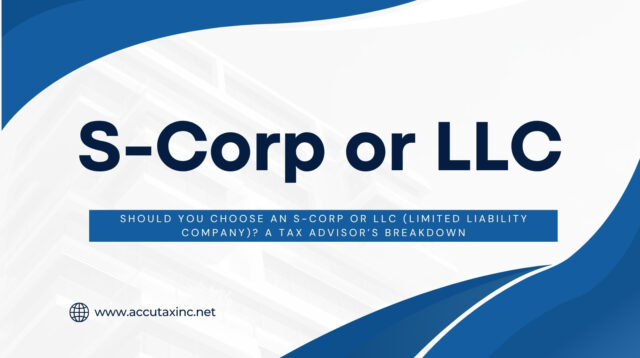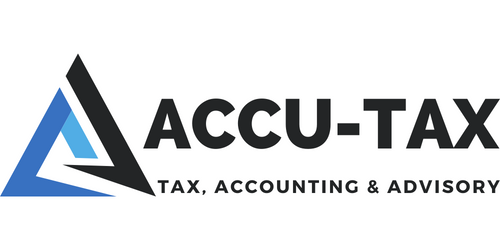
When starting a new business, one of the most critical decisions you’ll make is choosing the right business structure. Two of the most popular options for small business owners are the Limited Liability Company (LLC) and the S Corporation (S-Corp).
Each offers unique tax benefits, ownership flexibility, and legal protections. In this guide, we’ll break down the key differences from a tax advisor’s perspective to help you make the best decision for your business.
1. Understanding the Basics
What Is an LLC (Limited Liability Company)?
An LLC is a business entity formed under state law that provides limited liability protection to its owners (called members).
-
A single-member LLC is typically taxed as a sole proprietorship.
-
A multi-member LLC is taxed as a partnership by default.
-
LLCs can also elect corporate taxation (C-Corp or S-Corp) by filing the appropriate IRS forms.
What Is an S-Corporation (S-Corp)?
An S-Corp isn’t a type of entity—it’s a tax election made by a corporation or an LLC that qualifies under IRS rules.
S-Corps are pass-through entities, meaning profits, losses, deductions, and credits flow directly to shareholders’ personal tax returns. This helps avoid double taxation that applies to C-Corps.
2. Formation and Eligibility
LLC Requirements
-
Simple to form under state law.
-
No limits on the number or type of owners.
-
Can be owned by individuals, corporations, LLCs, or even foreign entities.
S-Corp Requirements
-
Must be a domestic corporation or LLC.
-
Limited to 100 shareholders or fewer.
-
Shareholders must be U.S. citizens or residents (no partnerships or nonresident aliens allowed).
-
Can only issue one class of stock.
3. Taxation Differences
How LLCs Are Taxed
-
Single-member LLCs: File taxes via the owner’s personal return (Schedule C, E, or F).
-
Multi-member LLCs: File Form 1065; members receive a Schedule K-1 showing their share of income.
-
LLCs can choose to be taxed as an S-Corp by filing Form 2553.
How S-Corps Are Taxed
-
File Form 1120S annually.
-
Shareholders report income through Schedule K-1.
-
Reasonable salaries must be paid to shareholder-employees, and only those wages are subject to payroll taxes.
-
Remaining profits can be distributed as dividends, which are not subject to self-employment tax.
4. Self-Employment Taxes
-
LLC Members: All net income is generally subject to self-employment tax.
-
S-Corp Shareholders: Only salaries are subject to employment taxes—distributions are not, potentially reducing tax liability.
5. Administrative Requirements
-
LLCs: Simple operation, minimal paperwork, flexible management structure.
-
S-Corps: Must hold annual meetings, maintain corporate minutes, and meet IRS standards for reasonable compensation.
6. Changing Classification
An LLC can elect S-Corp taxation by filing IRS Form 2553, as long as it meets eligibility requirements. However, once made, the election typically cannot be reversed for five years (60 months) without IRS approval.
7. When to Choose an LLC
You may prefer an LLC if you:
-
Want flexibility in ownership and management.
-
Prefer fewer administrative requirements.
-
Don’t want restrictions on who can be an owner.
8. When to Choose an S-Corp
An S-Corp may be right for you if you:
-
Want to reduce self-employment taxes.
-
Can meet ownership and structure requirements.
-
Are comfortable with additional compliance and recordkeeping.
9. Key Takeaways
-
Both LLCs and S-Corps offer limited liability protection and pass-through taxation.
-
S-Corps can reduce self-employment taxes but have stricter requirements.
-
LLCs provide greater flexibility but may lead to higher self-employment taxes unless you elect S-Corp status.
Final Advice
Choosing between an LLC and an S-Corp depends on your business goals, profit expectations, and comfort with administrative responsibilities. A qualified tax advisor can help analyze your specific situation and recommend the most tax-efficient structure.
Further Reading
Need Help Choosing Between an LLC and an S-Corp?
If you’re unsure which structure is right for your business, contact us today. Our experienced tax advisors can help you evaluate your options, minimize your tax burden, and set your business up for success.

